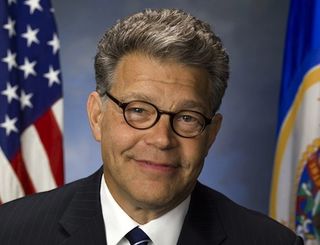Franken: Comcast/TWC Is Just Too Big

Sen. Al Franken (D-Minn.), a member of the Judiciary Committee, hammered the Comcast/Time Warner Cable deal in an interview for C-SPAN's Communicators series, saying he concludes it will be bad for consumers and constituents because that is what happens when big media companies merge. "This is consolidation, and consolidation means leverage."
Actually, he was invited on The Communicators following Comcast exec David Cohen's appearance on the show several weeks ago, where Cohen talked about the benefits he saw in the deal. Franken is one of the deal's biggest critics.
Sen. Franken has said the merger would result in higher prices, fewer choices and worse service because "that has been the case when there is consolidation of media and telecommunications."
When the biggest cable TV company and biggest ISP wants to buy the second biggest cable company and third biggest ISP, "that's just too big."
Comcast has argued that it needs that scale to compete with national competitors like satellite and over-the-top providers.
Franken says that Comcast has about 12% or 13% of TV programming after it bought NBCUniversal, a deal Franken, a former NBC employee in his Saturday Night Live days, also strongly opposed. It is the combination of those programming and cable system assets with the combined company's broadband reach—anywhere from 20% if wireless broadband is included, which Comcast does, to 40% without wireless, to 50% if DSL is not included, that Franken says makes it too big.
Franken pointed out in the Senate Judiciary Committee hearing on the TWC deal this week that when Comcast CEO Brian Roberts was testifying in support of the NBCU deal, one of his arguments was that it was OK to buy NBCU content because it competed against "all these other distributors," and he mentioned Time Warner Cable as one of those competitors. Franken said that Roberts had defended the vertical integration by saying it was not expanding its distribution, which it now wants to do with the TWC deal—Comcast will pick up some 8 million subs after spinning off about 3 million to try and make it more palatable to Washington.
Broadcasting & Cable Newsletter
The smarter way to stay on top of broadcasting and cable industry. Sign up below
"They can't have it both ways, and they are trying to have it both ways," said Franken. "They say at one hearing: 'We compete with Time Warner Cable,' then a couple of years later it'fts, 'Oh, we don't compete with Time Warner Cable.'"
While Comcast's system spinoffs will keep it under the FCC's former 30% national cap on subs, Franken suggested the relevant number was its percentage of broadband subs, plus the 12% or 13% of programming. "The original 30% was about one sector, cable TV. It is very different when you have all of these pieces that you are putting together and that you can leverage."
Asked how he would increase competition in the cable marketplace, Franken said the first thing would be not to allow the merger, though he conceded it was up to the FCC and Justice, not him. But, he said: "That is where I would start."
Franken grilled Cohen during the hearing, but suggested in the interview that it was not personal but instead part of his job and duty to his constituents, many of whom had raised objections to the deal. "Mr. Cohen seems like a really smart guy. He's a really great guy, I'm sure, and I can say about him that he earns, sort of, what he gets. But my job was to ask him tough questions."
Contributing editor John Eggerton has been an editor and/or writer on media regulation, legislation and policy for over four decades, including covering the FCC, FTC, Congress, the major media trade associations, and the federal courts. In addition to Multichannel News and Broadcasting + Cable, his work has appeared in Radio World, TV Technology, TV Fax, This Week in Consumer Electronics, Variety and the Encyclopedia Britannica.

